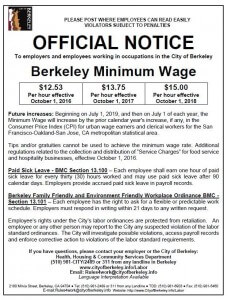 The City of Berkeley has two new laws that provide employees with work flexibility and financial stability when they need time away from work for personal wellness and family responsibilities. The first measure goes back to the election in November 2014, when 78% of voters called on the City Council to pass a “right-to-request” flexible workplace law. More recently, the city turned its attention to the pressure workers face to work even when they are sick. Both actions led to the adoption of the city’s “Paid Sick Leave Ordinance” and the “Family Friendly and Environmentally Friendly Workplace Ordinance”.
The City of Berkeley has two new laws that provide employees with work flexibility and financial stability when they need time away from work for personal wellness and family responsibilities. The first measure goes back to the election in November 2014, when 78% of voters called on the City Council to pass a “right-to-request” flexible workplace law. More recently, the city turned its attention to the pressure workers face to work even when they are sick. Both actions led to the adoption of the city’s “Paid Sick Leave Ordinance” and the “Family Friendly and Environmentally Friendly Workplace Ordinance”.
Paid Sick Leave Ordinance
Often, workers without paid sick leave will choose to work while ill to avoid a reduction in their paychecks. Not only are sick workers less productive, they compromise the health of others in the workplace. The city’s Paid Sick Leave Ordinance has multiple benefits. It provides employees protection against loss of income during absences from work due to personal or family health reasons. It has the effect of limiting the spread disease in the workplace and in the community. It also allows workers to access preventive care for themselves and their family members.
The Paid Sick Leave Ordinance is effective October 1, 2017. Under the Ordinance, employees accrue one hour of paid sick leave for every 30 hours worked. Small businesses (fewer than 25 employees) may cap accrued leave to 48 hours per year. Large employers (25 or more employees) may cap accrued leave at 72 hours, although employers may set higher limits. Employers that have an existing, equally effective paid leave policy are not required to provide additional leave. Sick leave may be used for the employee’s or a family member’s illness, injury, medical care, treatment or diagnosis of a health condition.
“Right-to-Request” Ordinance
The Family Friendly and Environmentally Friendly Workplace Ordinance, or “right-to-request” law, went into effect on March 16, 2017. The law gives employees the right to request predictable and flexible working arrangements from their employers. Permitting an employee to request a stable or modified working arrangement enables employees to better manage family responsibilities, which translates into increased employee satisfaction, reliable employee performance, and a reduced impact on the environment.
Examples of a “flexible working arrangement” include a modified work schedule, changes in start or end times of work, part-time employment, job sharing, working from home, telecommuting, a reduction or change in work duties, or part-year employment. A “predictable working arrangement” means a consistent or reliable work assignment that may include scheduling days, start and end times, or work site location with at least seven days notice prior to the start of the scheduled shift.
Employees must make working arrangement requests in writing. Employers must meet with the employee within 21 days of the request and to respond to the request in writing. An employer may grant or deny the request, but may not retaliate against an employee for making a request. An employee whose request has been denied may ask for reconsideration.
Notice
Notice of the paid sick leave law and the right-to-work laws must be posted in the workplace. The law requires the notices to be posted in several languages. To order the new Berkeley Labor Standards Poster, click here.
